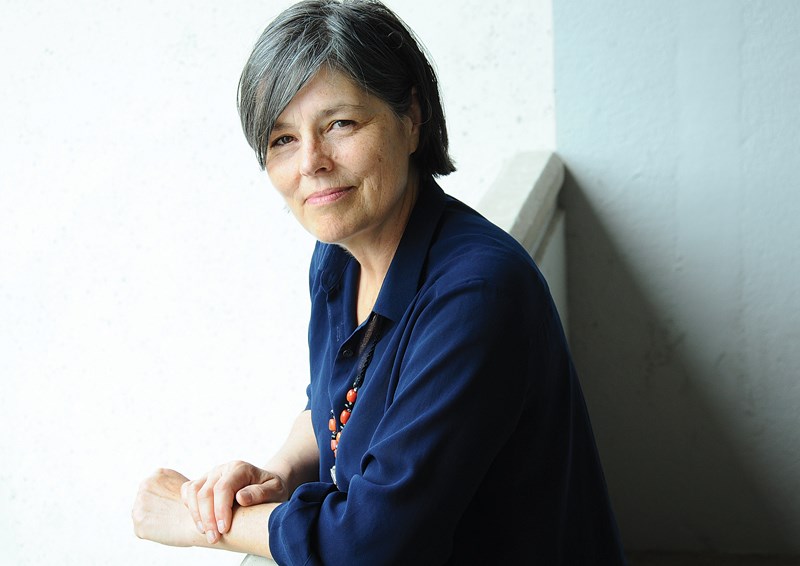Book Signing and Meet and Greet: Claudia Casper, author of The Mercy Journals Saturday, June 18, 1-3 p.m. Indigo Books, 1015 Marine Dr., North Vancouver.
What if there are no muscle cars in the future?
What if Mad Max’s souped-up Interceptor never barrels through the wasteland beyond the horizon, there’s no Hunger Games, no maze to run or end to childhood and no immunity to Captain Trips?
What if the future is about coping with the evil that’s been in our bones since the first chimpanzee wrapped his fist around a tool?
When I call Claudia Casper, the author of post-apocalyptic novel The Mercy Journals, the power has just gone out at her Hornby Island home.
Nursing a cup of camp coffee in the dark, she ponders what life might be like if the lights never came back on.
“Our species is wonderful and awful,” she declares. “We have the potential to go a whole bunch of different ways.”
Humans can be collaborative and resourceful, but Casper is keenly aware of the dark half, something malicious in the mammalian brain.
When the Hutu began murdering the Tutsi minority in Rwanda, Casper says she noticed a strain of self-righteous commentary that seemed to imply “only those people committed genocide. ... And for ‘those people’ read: Africans, Arabs, the Germans, the Japanese.”
While that notion is easily debunked by examining the extermination of the Beothuk First Nations, Casper wanted to establish that the propensity for mass murder doesn’t belong to a particular culture or ethnicity.
“It’s in all of us,” she says.
In 1974 a chimpanzee was murdered in Tanzania by chimps from a rival band.
The Gombe Chimpanzee War, chronicled by Jane Goodall, ended when one tribe exterminated the other.
“I wanted to write a book about genocide and that behaviour … at least incorporating an evolutionary perspective,” Casper said. “Any behaviour that’s common to us and the great apes, is behaviour that would have been common in our ancestors.”
By setting her story in the future, Casper says she hoped to avoid political singularities and illuminate atrocities “in a more universal way.”
The Mercy Journals takes the form of a found diary – the book’s pages includes rough edges to convey a weathered, beaten look. Narrated by our protagonist – not our hero – Allen Levy Quincy, Casper captures the old soldier’s past and present in short segments meant to appeal to young readers who live with the ever present lure of the online world.
An intelligent, introspective man, Quincy’s isolation is revealed most tellingly during a brief, excruciatingly uncomfortable encounter with a fellow veteran.
“Lola tried to look me in the eyes,” Quincy narrates. “I appreciated the effort.”
The key word is “tried.” Meaningful human contact seems impossible for Quincy, who likens the relationship between old soldiers to “a family who has buried a murdered child.”
Casper’s inspiration for Quincy was retired Lieutenant-General Romeo Dallaire, who was commander for the U.N. Assistance Mission for Rwanda when the 1994 genocide – which took the lives of approximately 800,000 - began.
Casper recalled reading about Dallaire being discovered drunk and semi-conscious on a park bench in Quebec.
“His story just riveted me,” Casper says, describing her fascination with a good man who has witnessed something catastrophic.
In the story, Quincy is born in 1989, which would make him about 27 today.
That choice is deliberate, as Casper is especially hoping to reach readers in their 20s and 30s.
“They’re going to be probably the ones most hit with this,” she says.
The world of The Mercy Journals is incredibly nuanced, imagining everything from the tepid future of the refrigerator to bandwidth limits that force everyone to abide by a “cloud storage quotient.”
While imagining the future can be a great challenge (visionary author Phillip K. Dick once created a world where interdimensional travel was easy but people still used phone books), Casper has spent eight years ruminating on the logical consequences of global climate change.
“When I imagined a post-climate change future, for me, it was my backyard and wondering what that would look like,” she says. “I think deer are going to be pretty crucial … and you’d want a chicken, you’d really want a chicken.”
Despite looming threats to human survival, Casper is still holding tight to the last item in Pandora’s box.
“I’m a long way from being without hope.”



